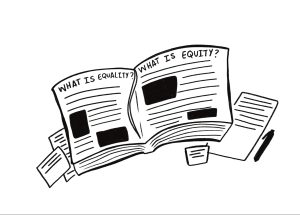
Equality is a hefty topic of conversation in the world, with leaders and activists constantly discussing how we can go about increasing equality in politics, education, health, etc. What is often missing from this conversation, however, is what equality really means. Equality is defined as the state of being equal, particularly in status, rights and opportunities.
Achieving equality is a difficult road, and leaders have a habit of cutting corners to create blanket statements of equal access when this does not often equate with equal opportunity. Citizens on all party sides have a habit of believing what they hear, even if not backed by research or facts, and it is the job of politicians to educate rather than justify outdated practices by creating anger amongst their constituents. The conversation is in desperate need of changing, specifically towards equity.
Equity is similar to equality but different in that it adjusts for fairness. You can think of it as leveling the playing field. If three different people of different heights are all standing behind a fence trying to watch a baseball game, one may be able to see over it on their own, one may need a small stool, and one may need a much larger stool to be able to have the same view.
What this means is that different people need different things to be able to achieve the same end goal. To reach a truly equal opportunity landscape, we need to create equitable opportunities for different groups within society.
In Mississippi, groups like the American Civil Liberties Union are working toward creating an equitable future by enacting campaigns and legislation that challenge the embedded power imbalances in the state. This battle is difficult, especially in a conservative state with a history of not acknowledging the inherent disparity between citizens of different races, ethnicities, gender identities and sexualities.
Basic facets of society like education and public health are affected deeply by the lack of equity between groups and while working for equality in these spheres is admirable, it is not enough. One of the most prominent steps forward in the education sector in regards to equity was affirmative action, a set of policies within universities across America that ensured adequate representation of minority groups.
This year, affirmative action is being brought before the Supreme Court with the possibility of being eliminated altogether, which would lead to the compounding of lingering racial inequities in all of society, not just education. Considering the Supreme Court only hears cases when the social climate calls for answers, this case is already proof that all too many citizens do not understand the institutional practices that continue to promote racism and other prejudices to this day.
Take, for example, pay in the workforce. Studies show that while companies often have equal pay for the same jobs, white employees tend to hold the highest-paying jobs, which is not an equitable workforce.
Pay equity employs a more complex approach to study these problems in efforts to determine where systemic issues could be affecting pay gaps. Subconscious bias and discrimination affect all aspects of the workforce, from hiring to pay to promotional timelines. These biases affect all sorts of underrepresented groups, with prejudices extending based on gender, sexuality and even age.
Making steps to create equitable environments means a lot of hard work, from everyone. People need to take the time to examine themselves for where their own biases exist and work toward correcting outdated and discriminatory perceptions and practices.
Giving people the exact same resources may seem at first glance like a beneficial practice, but real change comes when we start tailoring the resources we give to people’s individual circumstances and needs.
Despite popular opinion, fairness is not determined by ensuring you have the same things as everyone else; it is determined by ensuring everyone has the things they need to reach the same finish line as everyone else. And — heads up — if you think that is unfair to you, it is because you already have the resources you need. Fighting for fairness is fighting for equity, for everyone, not just those who already have it.
Liv Briley is a junior integrated marketing and communications major from Lemont, Ill.


























